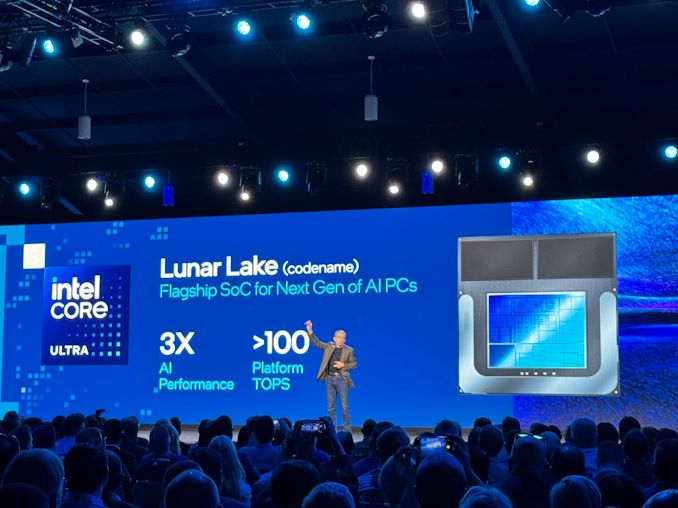
During the main keynote at Intel Vision 2024, Intel CEO Pat Gelsinger flashed a completed Lunar Lake chip off, much like EVP and General Manager of Intel’s Client Computing Group (CCG) Michelle Johnston Holthaus did back at CES 2024. The contrast between the two glimpses of the Lunar Lake chip is that Pat Gelsinger gave us something juicier than just a photo op. He clarified and claimed the levels of AI performance we can expect to see when Lunar Lake launches.
According to Intel’s CEO Pat Gelsinger, Lunar Lake, scheduled to be launched towards the end of this year, is set to raise the bar even further regarding on-chip AI capabilities and performance. At Intel’s own Vision event, aptly named Intel Vision, current CEO of Intel Pat Gelsinger stated during his presentation that Lunar Lake will be the ‘flagship SoC’ for the next generation of AI PCs. Intel claims that Lunar Lake will have 3X the AI performance of their current Meteor Lake SoC, which is impressive as Meteor Lake is estimated to be running around 34 TOPS combined with the NPU, GPU, and CPU.
Factoring in the NPU within Meteor Lake, 11 of the 34 TOPS come solely from the NPU. Still, Intel claims that the NPU on Lunar Lake will hit a large 45 TOPs, akin to the Hailo-10 add-in card and similar to Qualcomm’s Snapdragon X Elite processor. Factoring in the integrated graphics and the compute cores, Intel is claiming a combined total of over 100 TOPS, and with Microsoft’s self-imposed guidelines of what constitutes an ‘AI PC’ coming in at 40 TOPS, Intel’s NPU fits the bill.
Intel also alludes to how they are gaining a load of TOPS performance from the NPU, whether that be with new technologies; the NPU will likely be built in a more advanced node, perhaps Intel 18A. Another thing Intel didn’t highlight was how they were measuring the TOPS performance, whether that be INT8 or INT4.
Still, one thing is clear: Intel wants to increase on-chip AI capabilities in desktop PCs and notebooks with each generation. Intel is also attempting to leverage more AI performance to help boost its goal to ship 100 million AI PCs by the end of 2025. Intel has already announced that it’s shipped 5 million thus far and plans to sell another 40 million units by the end of the year.






